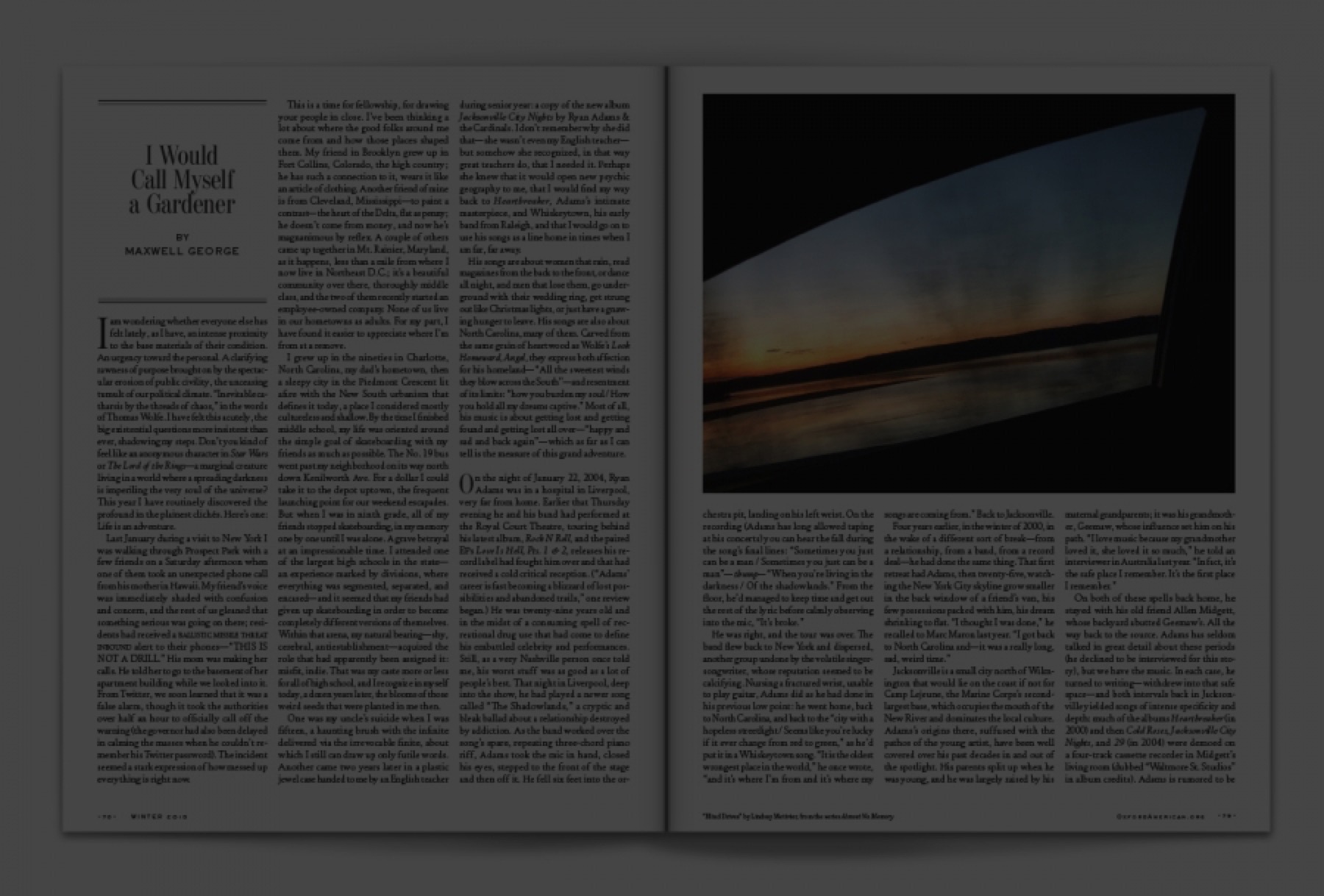
An essay by the author on Ryan Adams in the North Carolina Music Issue
FOUL IN WISDOM
By Maxwell George
Following up on Ryan Adams
Ryan Adams is, allegedly, a predator. We know this because of courageous accounts by women who came forward with their traumas: Mandy Moore, Phoebe Bridgers, Courtney Jaye, Megan Butterworth, and a young woman identified as Ava. Last week’s news is a colossal disappointment for Adams’s fans—many of whom, like myself, had remained loyal to his music despite his career of public tantrums and well-documented selfishness. And it is an embarrassment for many writers and critics who gave him our words, thereby ensuring his celebrity and thus his power, so often situating his assholery as an excusable byproduct of tortured genius. Longtime Oxford American contributor Amanda Petrusich, writing yesterday for the New Yorker, diagnoses the enabling culture of music criticism clearly and powerfully:
The practice was largely founded and developed by male writers, who understood hedonism as a display of authenticity (maybe as the only display of authenticity), and its language still hinges around vaguely mystical ideas about art-making as a kind of bloodletting. For decades, that language has been used to protect and enshroud troubled men, and to dismiss and humiliate women working in the same register.I am implicated in the cycle of Adams’s manipulations and for this I’m sorry. In the latest issue of the Oxford American, the North Carolina music issue, I published an essay about his strained relationship to our shared home state, where he hasn’t performed since 2005. (A friend’s text about the revelations: “Never trust a Carolinian who don’t love Carolina.”) How those pages could have celebrated any number of deserving songwriters: Whiskeytown’s Caitlin Cary, Mandolin Orange’s Emily Frantz, Tift Merritt (Adams’s old label mate, who has written about the creative pressures she faced as a young woman in the music industry for this magazine), H. C. McEntire, Kelsey Lu—or better yet, some undiscovered North Carolina artist, someone like Ava, the kind of fledgling talent men like Adams attempt to thwart to serve their fragile, rapacious egos. (Having lovingly quoted The Lord of the Rings in the essay, I turn now to what Tolkien wrote of his corrupted villain: “Sauron was become now a sorcerer of dreadful power, master of shadows and of phantoms, foul in wisdom, cruel in strength, misshaping what he touched, twisting what he ruled, lord of werewolves; his dominion was torment.”) May the rest of their kind be revealed.
And in the meantime, let’s fill the resounding silence—what we realize we will never get to hear from the victims of a patriarchal, predatory industry—with other music. On Friday, Adia Victoria (who appeared on the cover of the Oxford American’s Visions of the Blues music issue in 2016) releases her long-awaited second album. When I interviewed Victoria a few weeks after Donald Trump’s election, she made a point to call out the national surprise at his triumph. “The way that I’m looking at myself and the political landscape that I have to create in—it’s been fucked up,” she said. “My art comes from living my life and this is the world that I’m living in. It’s going to be represented on my next album.” That work is here and it’s titled Silences, a collection of magnificent, mysterious songs about taking on a world intent on marginalizing an artist like Victoria and reclaiming one’s power—personal, political, creative.
Enjoy this story? Subscribe to the Oxford American.


